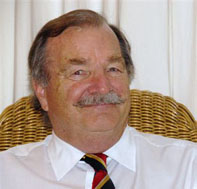Today is International Columnists Day when newspaper columnists the world over traditionally update a past column so they can knock off early and sort out their beer mat collection.
It gives me the opportunity to recount how, some years ago, I read that Princeton University was working on the collected papers of Albert Einstein. Time said it was “one of the most ambitious publishing ventures ever undertaken in the history of science”.
Ha! I tried to imagine what it would be like if somebody tried assembling the collected papers of James F Clarke when he finally parks his bicycle.
Actually, my papers are already in a collected condition – piled high in cupboards, on shelves and in boxes in the garage.
Finding material that might prove remotely interesting would be the challenge.
I can see it now – a two-man team from the new University of Ogies’ English department headed by Professor Fanie Phello.
The prof stands scratching his brainbone. He is dwarfed by a mountain of paper – cuttings, tear sheets, lists headed “things to do” and inscribed, “fix back door, replace hall light, sharpen knives, get Band Aid, get car serviced; cholesterol check; pick up post; Marmite; cheese; superglue; fix kitchen tap…”
Prof Phello speaks to his assistant, Thola Izibi: These lists of ‘things to do’ are endless and obviously he never got around to doing them. Take ‘Fix kitchen tap’ – it appears on lists spread over many years.
Izibi: Over here are drawers and drawers of papers and boxes all labeled “M”.
Prof: Yes, that would be his secretary, Threnody Higginbottom whom he insisted on calling ‘Miss Smith’. She filed everything under M for Miscellaneous.
Izibi: Well it’s mostly letters from readers whom, I understand, used to write his column for him. And lots from medical aid.
Prof: Medical aid? That could be interesting – they might tell us something about his health.
Izibi: The letters are mostly to inform him that his medical fund is not prepared to pay his Wine Club bills and that he must desist from trying to claim them each month. It appears he read somewhere that red wine was good for the heart and he felt it should be considered as “chronic medicine”. He also used to send them his bills for All Bran and …
Prof (interrupting): Ah, what have we here? A letter from Buckingham Palace! It’s from the Queen’s assistant deputy private secretary, Sir Percy Snodfellow, begging Clarke to stop asking the Queen to write a foreword for his proposed book titled Prince Charles and me,(or I). It appears he once met Prince Charles and shook his hand and said “How d’you do?” That, for a journalist of Clarke’s calibre would have been the basis for a thick ganglion-flattening book.
Izibi: We must surely find something that gives an insight into what sort of fellow he was. He rose, after all, to head the biggest society in South Africa – Densa, the club for those too stupid for Mensa, the society for the highly intelligent.
Prof: Yes, that figures.
Izibi: But, Prof, Densa had some great ideas. Imagine if Densans had taken over South Africa! Who knows – traffic lights might have worked again; traffic cops would have come out from behind the bushes to help motorists for a change.
The cops would have arrested bad taxi drivers and sentenced them to filling in potholes.
The government would have introduced capital punishment for anybody caught putting up posters on suburban trees… or saying “isit?” every time somebody told them something.
Prof: You seem to be impressed by Densa.
Izibi: (Cough. Cough.) My grandfather was a closet member.
Filed under: Densa, General | Leave a comment »




